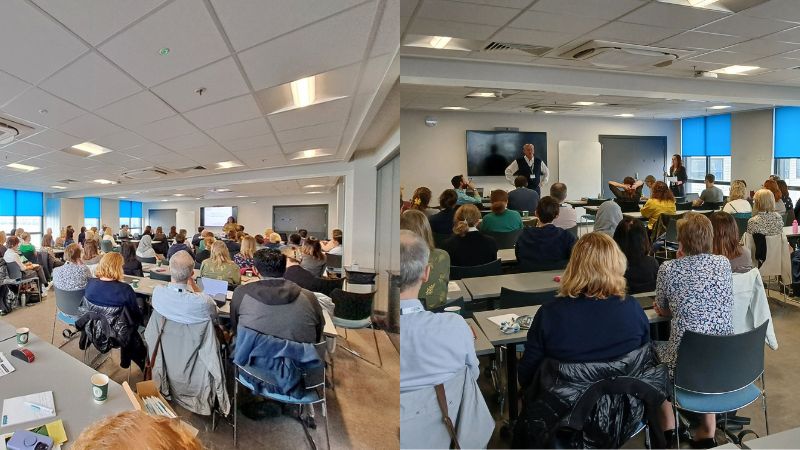Oxford Institute for Applied Health Research Symposium

Fostering collaboration and conversation to drive innovation and tackle shared healthcare challenges.
This September, the Oxford Institute for Applied Health Research (OxInAHR) hosted its 2024 symposium, gathering over 100 clinicians, academics, and researchers from institutions including Oxford Brookes University, the Oxford Health NHS Foundation Trust, Oxford University Hospitals, and Oxford University. The event aimed to build bridges between research and clinical practice, sparking new dialogues around shared healthcare challenges.At the symposium’s heart was a mission to foster collaboration. “It was a great chance to find synergies and build stronger, lasting connections,” said Professor Paul Carding, Director of OxInAHR and one of the symposium’s organisers. “Oxford is a world leader in healthcare research, but we’re particularly interested in applied healthcare research—research that can actively change clinical practice, improve patient outcomes, and ultimately maximise quality of life.”
One striking aspect of the event was the emphasis on informal networking. While structured presentations and Q&A panels formed part of the day’s schedule, a significant goal was to create space for casual exchanges that often spark collaboration. According to Professor Benita Olivier, chair of the organising committee of the symposium, “getting people in the same room to chat over tea or a snack is invaluable, as these encounters often lead to real partnerships.” A recent project, she noted, emerged simply because two participants found themselves seated together at the event.
The symposium also underscored the need for a multidisciplinary approach to healthcare. "It’s easy for us to become siloed in our thinking, whether we’re in hospitals or universities," Benita explained. "Healthcare research can no longer rely on single-discipline solutions. To tackle health issues of the future, we need a range of perspectives and expertise."
The event’s diverse lineup of speakers—from PhD students to senior clinicians—also highlighted the collaborative potential across different career stages. The keynote panel, representing all four institutions, provided an overview of organisational visions, research ambitions, and shared challenges. Following the keynote, parallel sessions and breakout rooms allowed researchers to present ongoing projects, prompting lively discussions that revealed untapped research synergies
An afternoon session gathered participants into smaller groups to identify ways to optimise enablers and overcome barriers to collaborative research, a discussion informed by a pre-event survey. “We’re generating a report from this session to provide a foundation for strategic planning,” Benita said. She emphasised that while symposia typically yield intangible wins in knowledge exchange, OxInAHR wanted to provide attendees with actionable insights that could inform concrete strategies for future work.
“Workplace culture often shapes how research is conducted,” Paul noted. “Many academics are caught up in administrative demands and teaching responsibilities, and clinicians face immense pressure from patient care. Finding the space to collaborate isn’t always straightforward.” But with a shared focus, they believe, clinicians and researchers can prioritise their commitments to collaboration, enhancing the overall quality of both education and patient care.
Reflecting on the symposium, both Paul and Benita see the event as a starting point. Plans are already underway for an expanded annual symposium, with a goal of attracting 250 participants, in 2025. Sponsored by the Oxford Academic Health Partnership, this event aims to bring all four institutions together to showcase their research across a single day, reinforcing the value of interdisciplinary work. “We want to make collaboration a core part of Oxford’s healthcare research culture,” Benita added.
With three specialist research centres, OxInAHR is positioned to lead these collaborative efforts both locally and nationally. The institute’s ongoing commitment to partnership and interdisciplinary dialogue aims to drive innovation in healthcare research and set a precedent for collaborative approaches in tackling healthcare issues.
Featured staff
Professor Paul Carding
Director of OxINMAHR (Oxford Institute of Nursing, Midwifery and Allied Health Research)
